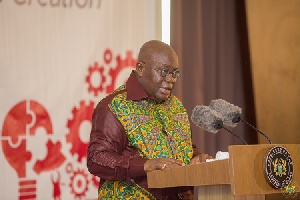Being an entrepreneur is a very challenging task the world over and it is even more challenging in Africa. In the country's quest to promote entrepreneurship, the President, Nana Akufo-Addo, on Thursday, July 13, 2017, launched the National Entrepreneurship and Innovations Plan (NEIP), he is quoted as saying;
“Let me introduce you to the National Entrepreneurship and Innovation Plan. This is the flagship initiative which will be the primary vehicle for providing an integrated national support for startups and small businesses.
Despite the severe constraints of our public finances, which have resulted from years of mismanagement and corruption, Government has contributed US$10 million as seed money for the Plan.
It is the intention that this seed money should be leveraged to raise money from private sources and public organisations to the tune of US$100 million to fund its programmes,” As much as I would love to praise the president, I am restrained out of fear for the policy's growth into fruition.
In Ghana, do we walk the talk? Your guess is as good as mine.But as a "Citizen and not a spectator" I would in my own opinion outline ways but not limited to how or what should constitute the policy to bring about its successful implementation henceforth achieving its intended purposes for which it were carved.
In my candid opinion, there should be a mentorship services for start-ups, including a national database of mentors. That is, for the intended purposes to be chalked, up and coming youths ( with intention of engaging in entrepreneurship) should be assigned mentors who are experienced or more knowledgeable to help guide the up and coming entrepreneurs and help rekindle the minds of the youth to be innovative to meet the demands of Ghanaians and as well provide a means of sustenance for themselves and the nation at large.
Entrepreneurship programmes in schools, from JHS, SHS through to tertiary level education, and in apprenticeship systems for those in the informal sector. You would all bear with me that, our educational curriculum needs serious adjustments in order to meet our growing needs as a country.
Due to the kind of things that are taught in our schools have become so obsolete that, students minds have become rigid that, they can not devise means/ways to solve daiy problems surrounding them. Aside these there should be measures to promote entrepreneurship among under-represented groups – including women, young people, disabled, migrants and older people to take up varied business opportunities around them.
There is also the need for specific reductions in the administrative burdens facing start-ups, including the length of time it takes to register a new business and the burden of applying for licences. That is, prospective business owners go through to tiresome , time consuming and cumbersome processes get their businesses registered or licensed.
These in one way or another deter such prospective entrepteneurs from wanting to operate and own businesses or better still has resulted in the rising numbers of unlicensed businesses operating within the Ghanaian economy, hence, it has impeded on the ability of such business owners or businesses to meet the required financial liquidity to Maximize their output as well as improve the quality their products to put them in a better position to compete internationally.
It is always difficult to source capital for your enterprise, no matter how bright the idea might be . Some banks have not been that helpful when it comes to supporting business start-ups. Access to finance is crucial for the growth of every business, but many small, micro and medium-sized enterprises (SMMEs) which are often anticipated to be the backbone of the private sector in the developing world.
They are also deemed to create jobs and provide a tax base for the local government yet have difficulties, as the risk capital market in Ghana is underdeveloped and banks increasingly avoid unsafe lending. According to Derry, the CEO of DreamOval, "we were able to pay themselves only after running the business for about two and a half years". Now, the question is: How did they manage to foot their bills and other expenses all this while?
More so, reaping the benefits of the internal and the international markets has not been accomodating for Ghanaian entrepreneurs as they have to grapple with rigid and fierce competition, a situation which has often favoured the international or foreign enterprises.
The government should also have support schemes for innovation by start-ups, innovation should be key and not just a lot of young entrepreneurs starting businesses which might and in most cases same or similar to those already existing but extra support scheme should be put in Place to emphasis on innovations in the setting up and operations of businesses.
In sum, I leave you with a quote by John C. Maxwell, "A leader is one who knows the way, goes the way and shows the way".
Opinions of Monday, 17 July 2017
Columnist: Mohammed Gazali Gazaf















